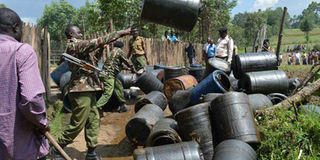Stem increase in manufacture and drinking of illegal liqour

Administration Police destroy illicit brews and their manufacturing apparatus along river Luvini in Shinyalu Constituency, Kakamega East Sub County. PHOTO | ISAAC WALE | NATIONMEDIA GROUP
What you need to know:
- In the quest to make quick money, unscrupulous manufacturers spike their backyard concoctions with deadly industrial chemicals to make them more potent.
- About 14,000 young people die each year from complications related to consuming illegally-brewed alcohol as many more victims are suffer permanent defects.
- It is the poorest of the poor who provide an immediate market for the uninspected alcoholic beverages which often contain lethal compounds.
The sudden increase in fake and unlicensed alcoholic products in circulation despite routine government directives and crackdowns is worrying. In the quest to make quick money, unscrupulous manufacturers spike their backyard concoctions with deadly industrial chemicals to make them more potent.
About 4 million Kenyans are currently consuming illicit brews. The number could rise during the electioneering period. While illicit alcohol causes health hazards, illegal business significantly hurts the economy and robs the country of young productive people.
Regrettably, about 14,000 young people die each year from complications related to consuming illegally-brewed alcohol while many more victims are suffer permanent defects. Rising numbers of illegal alcohol manufacturers are increasingly exposing millions of Kenyans to health risks such as substance poisoning.
It is the poorest of the poor who provide an immediate market for the uninspected alcoholic beverages which often contain lethal compounds.
ILLEGALLY REPACKAGED
Distributors and distillers have voiced concern about some of their popular brands being illegally repackaged and sold to unsuspecting consumers. Some traders have been counterfeiting Kebs quality marks using bottles of established manufacturers to package their illicit products.
It is scaring to note that more than 50 per cent of all alcohol outlets sell fake or adulterated products. More than 900 unlicensed factories could be manufacturing these brews. The rise in production and consumption has been fuelled by individuals who collude with corrupt law-enforcing officers to facilitate the peddling.
Genuine manufacturers suffer loss due to the production of second generation alcoholic products.
They also lose revenue as dubious dealers command 30 per cent market share of the alcoholic multi-billion industry.
The unlawful trade is robbing the country of more than Sh30 billion annually in revenue as the dealers do not pay tax and yet they shrink revenues of those who do.
Simply put, illicit alcoholic beverages are a threat to human health, security and the economy. The law imposes strict penalties against those found manufacturing or distributing illicit alcohol, including a Sh2 million fine or a jail term of up to five years.
APPLY FOR LICENCES
The law also sets penalties against those selling alcohol to under-age consumers and to police officers in uniform.
Traders are required to apply for licences from sub-county committees and be cleared by public health officers. They are required to sell the brew at market centres and not in residential areas. As long as a steady market exists, and sections of authorities are all too willing to turn a blind eye, illegal drinks are here to stay.
Sporadic raids are not the solution to the problem of illicit drinks. The national and county governments need to stand firm, withdrawing and or revoking licences of traders, who produce, distribute or retail illicit brews. A standard legislation needs to be taken up by the Council of Governors.
Nacada should bring together stakeholders to address this growing challenge as the elections season sets in. Rogue government officials involved should be relieved of their duties immediately and be made to answer to the law. A continuous consumer sensitisation on dangers of illicit liquor is needed. Police bosses need to regularly avail information on arrests, seizures and volumes of such illicit drinks.
The Kenya Bureau of Standards ought to make it difficult for anyone to counterfeit its marks.
Media should give more publicity on the consumption and enforcement levels against illicit alcoholic beverages. County governments and security coordinators should work closely with licensed distributors and distillers to ensure that only licensed products are sold in their counties.
Mr Mutoro is the secretary-general of Consumers Federation of Kenya (Cofek) [email protected]




